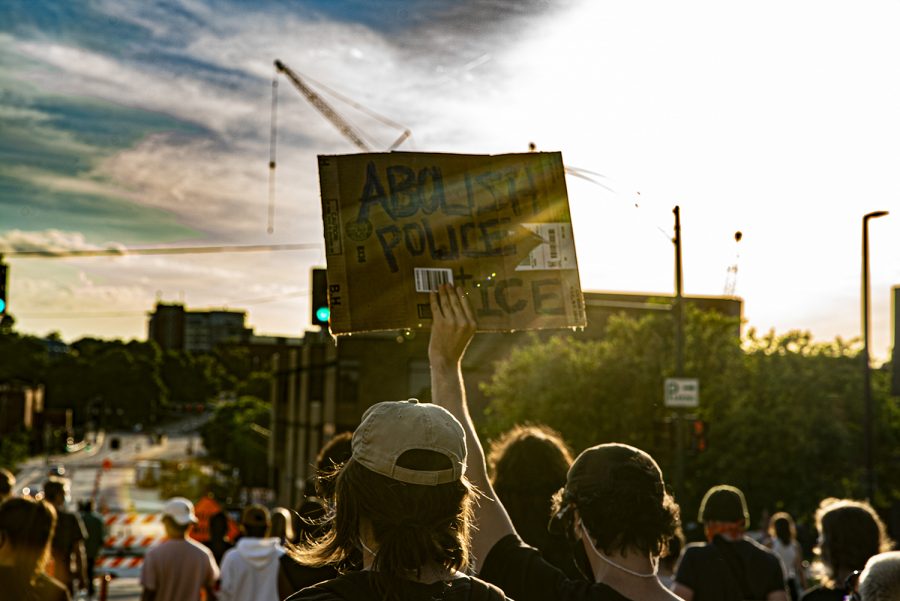Bill increasing penalties for unlawful protests passes Senate committee
A bill was voted out of the Judiciary Committee on Wednesday. A democratic senator, Tony Bisignano D-Polk, said the bill is “highly offensive.”
Iowa City citizens march through downtown as part of another protest on Sunday, June 14th, 2020. Iowa City, along with several other major cities across the country has spent the past few weeks protesting the murder of George Floyd at the hands of the police and systemic racism.
March 3, 2021
A bill that would increase punishments for certain protesters during protests was approved by the Senate Judiciary Committee on Wednesday.
Sen. Julian Garrett, R-Warren, who introduced the bill, said the bill would make law enforcement jobs in Iowa simpler and safer.
“They go out and risk their lives for us regularly. It seems that the least we can do is to make their jobs as safe as we reasonably can,” Garrett said.
The bill includes some key provisions of Republican Gov. Kim Reynolds’ “Back the Blue” act proposal, but does not include a ban on racial profiling.
The proposed bill, Senate File 497, will provide that people not be released within 24 hours of the time of arrest if they are arrested for criminal mischief, including rioting, unlawful assembly, disorderly conduct, and defacing, altering, or destroying any publicly owned property, such as a monument or statue.
The bill does permit some judicial discretion.
“The court may release the defendant…if the court finds that the defendant is not likely to immediately resume the criminal behavior based on the circumstances of the arrest and the defendant’s criminal history,” the bill states.
The bill also requires those convicted of damaging public property pay for the repairs.
According to the bill’s text, “the court shall include an order of restitution for any property damage or loss incurred as a result of the offense.”
SF 497 also would increase penalties for pointing lasers at others with the intent to cause injury.
A Black Lives Matter protest leader, Matè Muhammad, was arrested in Iowa City in September 2020 for allegedly directing a laser pointer at a police officer’s eye. Nine of the charges against Muhammad, who formerly went by Matthew Bruce, were recently dismissed.
The proposed bill will convict anyone who intentionally points a laser that emits light at another person with an intent to cause pain or injury to another a class “D” or “C” felony. This also includes a mandatory minimum imprisonment of two years, the bill states.
The bill also provides immunity for drivers who unintentionally injure someone who is participating in an unlawful protest. People who injure protesters with a vehicle would still be held liable if their conduct constituted “reckless or willful misconduct.”
Sen. Tony Bisignano, D-Polk, said the bill is “highly offensive.”
“This is mean spirited. This almost tells me that what you did last summer was not sincere. It was opportunistic,” Bisignano said, referencing the police reform bill the Legislature passed in June 2020. “I take this as an assault on my district in my city. Many of you don’t even hardly have a minority population.”
Last summer, Reynolds signed a bipartisan police reform bill to address systemic racism in Iowa.
As previously reported by The Daily Iowan, Reynolds said the signing of the police reform bill is a signal from the people of Iowa that they are willing to act on social justice reforms.
Garrett said that Iowa will not have a “civil society if we don’t have protection from the bad guys, the criminals.”
According to the bill, a riot is defined as three or more people assembled together in a violent manner, disturbing others, and using unlawful force against another person.
“A person who willingly joins in or remains a part of an unlawful assembly, knowing or having reasonable grounds to believe that it is such, commits an aggravated misdemeanor,” the bill states.
Presently, such criminal activity would be classified as a simple misdemeanor.
The bill will now go to the full Senate for a vote.















